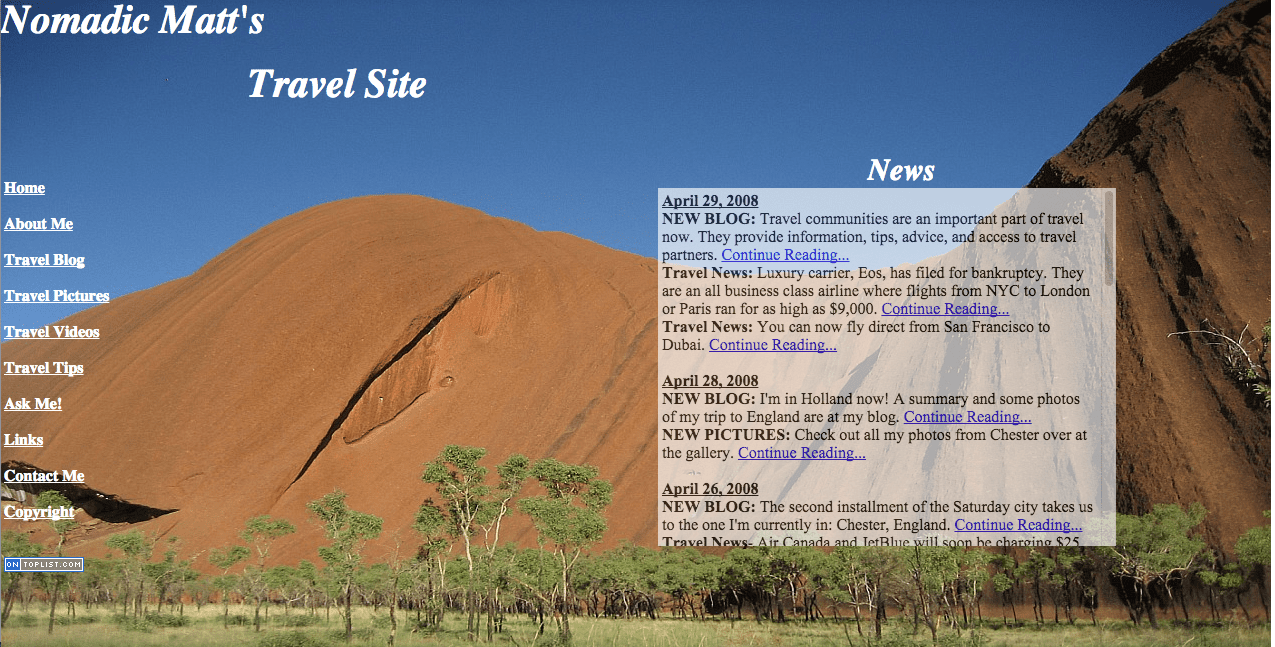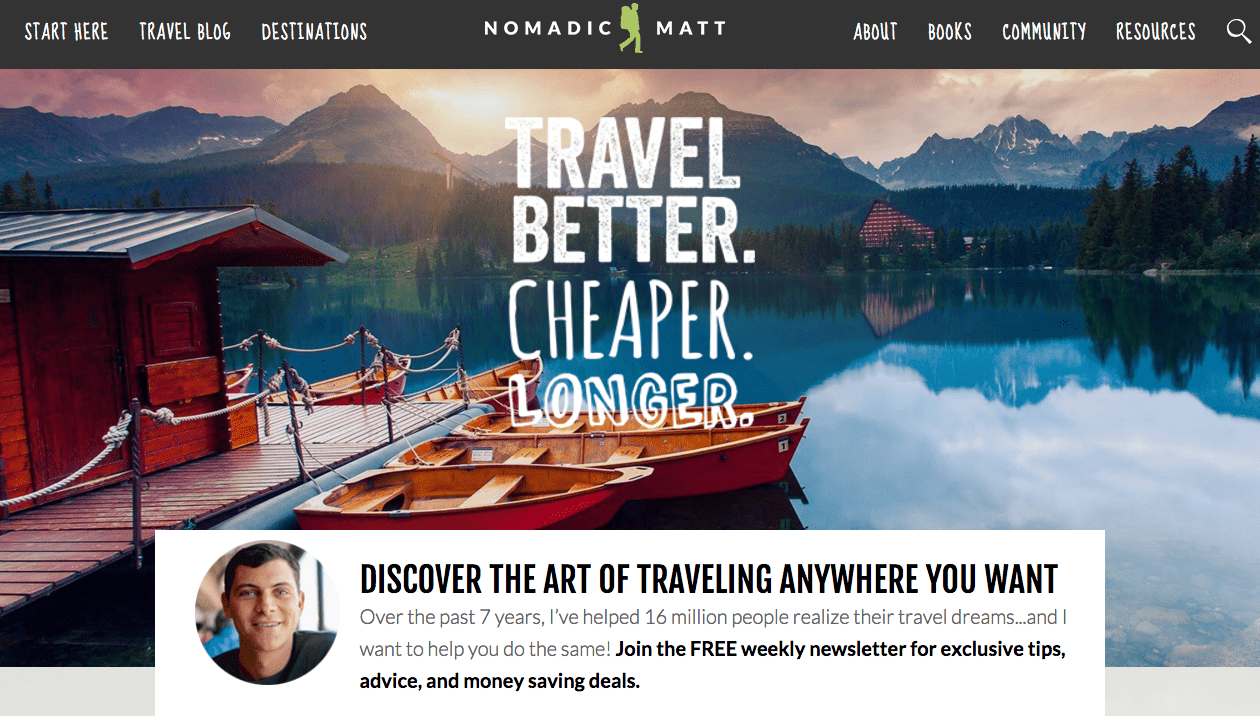
A couple of years ago, I was in San Francisco and was invited by the folks at Google Travel to visit their campus, where we spent a lot of time geeking out over travel booking data and metrics. One of the stats that stood out for me was that most consumers spend over 40 hours researching their trip and look at over 20 sites!
When I started planning my first trip around the world in 2005, there weren’t all the online resources we have now. I remember there was blog on backpacking Europe (basically what some girl did on her study abroad), a couple of forums, and a few others here and there.
Today, we have the Google Trips app; 100,000+ blogs; countless forums, communities, and sharing-economy websites; and everything in between. You can find information for anywhere you want to go. No destination is too obscure.
But, in that sea of endless information, how do you know what is accurate and trustworthy?
Like you, I spend a lot of time researching destinations before I go: blog posts, books, trip reports, hostel reviews, etc., etc. I love digging deep into the places I’m traveling to. It makes the trip seem real and like I’m discovering some secret.
But since I’ve been looking up information online and working in the travel industry for years, I can spot the BS really easily.
And today I want to help you do the same. Here is how to tell if the information you’ve found is valid — or should be treated skeptically:
(Note: I’m going to break down my thoughts in extreme detail, but it actually doesn’t take that long to process all this. I’ll give you some perspective at the end. It’s not as long as you think!)
Factors to consider when reading about destinations
Sponsored content: When I first come across an article, I scroll to the bottom to see if the content is “sponsored.” Sponsored content is (a) when a blogger is given a trip or product in exchange for a review or mention (and payment) on that blogger’s website, and (b) content that is basically advertising or marketing material (think some “awesome” contest they are telling you about). While organized press trips have been happening in the travel business for decades (and I’ve done them), sponsored content is something different. Since there is an exchange of money, I feel like it’s marketing. (For reasons that tie together below). I will still read the article – and it still might be useful – but I definitely want to know if someone was paid to go to that destination or promote that content. After all, there is a natural human inclination to sugarcoat the negatives if we’ve been paid to write about a place or product.
When I see “Thanks for the free trip, (insert tourism board name). All opinions are my own” without explanation, I’m a further wary. What was free? What was paid for? Did they receive money? I want to know more. I tend to take the suggestions with a grain of salt unless I see clearly what was sponsored, in a statement like “Visit Islay provided the car and accommodation and also connected me to distilleries so I could get the behind-the-scenes tours for this article. Meals, flights, and transportation to and from the island — as well as all that whisky I bought — were at my own expense.” So I want the article to be clear on what was and wasn’t paid for – because that will directly impact some of the other important things to keep an eye.
Replicable experiences: If the writer is writing about an experience that I can’t do or a situation I can’t replicate, the advice isn’t useful to me as a reader – and I immediately move on. It’s great that someone got to do something cool like eat a 3 star Michelin restaurant or cook dinner with Bourdain — but how does that really help me experience the place? Those kind of articles make for fun stories but nothing more. When I’m researching a destination, I don’t want a fun story, I want a helpful story.
Detailed content: How detailed is the article? The more facts, figures, and other details they include, the more I know they know their stuff. For me, advice that is detailed, practical, and replicable is the best kind of advice. I look for blogs and content that gives me insight into a destination or product like I would expect from a guidebook or magazine. All these signals tell me “This website is quality and trustworthy content and I should use it to plan my trip.”
This is why whether or not the content is sponsored / branded / whatever term people use is so important to me because the more the writer is paying their own way and doing what I would do, it’s more likely to include the nitty gritty facts and figures that will be useful to me as I plan my trip.
Bigger picture: Moreover, I look at that content within the bigger picture of their website. If I come across an article and I like what I’m reading, sponsored or not, I click around the website a bit more. If this blogger tends to do the kind of activities I like to do, I think to myself, “OK, we have a similar travel style. This person’s advice is going to benefit me.”
If I look around a website and see they mostly pay their own way, have detailed content, and are in the trenches like the rest of us, I’m OK with the small amount of sponsored content I see because in my mind, it will be more fair and balanced than someone who does mostly paid trips.
Website appearance: What does their website look like? Does it look loved? Is the design from 1999, or does it look like someone keeps the site up to date? It’s like a restaurant. While looks don’t 100% correlate to quality food, you’re more likely to go “the food is probably good here” if the restaurant looks like it wasn’t like renovated during the Nixon years. For example, look at my site:
In 2008:

Now:

Which one would you trust more? (Exactly. The newer version.)
Are they too negative? There are so many factors that go into whether or not you like a destination: the people you meet, the weather, the ease in which you got around, whether someone in your dorm snored, and so much more! When I look at someone’s opinion on a place, I look to see if they are just ranting or are truly being fair. “This place was terrible and you should never go” is a rant that should be taken with a grain of salt. Read it, file it away, but mostly ignore it. Years ago, I went on a rant about Vietnam and swore I would never go back. Since then, I’ve grown as a writer and a person. I had to add a little blurb at the end of the article saying this was my experience but you should go and experience it yourself. That article stays up because it’s part of the site but I cringe when I read it. It’s not the type of article that gives an accurate picture of a place nor is it one you should use when you plan your trip. Avoid articles like that!
Timely content: Lastly, how old is the article? Has it been updated? Travel changes so rapidly that an article that was written five years ago and hasn’t been updated since is one I don’t value. The article and content must be from within the last two years.
Factors to consider when researching a company or making a booking:
Most reviews are negative: First, when it comes to using a company or booking website you don’t know, it’s important to remember one thing: the majority of reviews are most likely going to be negative. Consumers use review sites to complain not to praise. It’s almost always how some company screwed them over. While that is sometimes the case (no company is perfect 100% of the time — and it’s not just obscure companies; I’ve had friends have terrible times trying to get a refund from Expedia), most of the time it’s because someone didn’t read the fine print.
So that’s the most important thing to remember: consumer reviews always tilt negative in the travel space, so you shouldn’t be too worried if a company has too many negative reviews (the devil is in the details, not some star rating!).
Consider why a review is negative: When looking at consumer reviews, I look to see why these people are having a negative experience. For example, if many of the negative reviews for a tour company talk about how their guide didn’t know anything, I begin to think, “Maybe this tour company isn’t that good.” But if the negative reviews are mostly “THIS IS THE WORST COMPANY EVER BECAUSE MY HOTEL WAS ONLY 2 STARS AND I EXPECTED 5 STARS FOR THE $500 I PAID!” then I’ll ignore those specific negative reviews. To me, these kinds of reviews are just rants, not helpful.
Expert opinion: What do travel writers, magazines, and newspapers say about this company? Do they match the negative consumer reviews, or do they paint the company in a different light? If tour company X has tons of negative consumer reviews but the majority of professionals say it is good, I’ll go with the professional opinion. If there’s a disconnect between what consumers say and what the majority of experts say, I trust the experts.
Next, consider the following:
How often a reviewer posts: When looking at user-generated reviews, I want to see how often a user posts (most sites show you). If someone posts just once and writes a scathing review, chances are they are trying to vent because they didn’t get what they want.
Beware too-positive reviews: People don’t like to hurt other people’s feelings, so on a lot of the sharing-economy sites, people sugarcoat their reviews, because these hosts or guides aren’t a faceless corporation. If some guy gave you a tour or if you stayed in someone’s house and it sucked, you’ll feel bad leaving a very negative review because you met that person and formed a (fleeting) relationship with them.
Beware a lack of details: This is how I ended up in an Airbnb that was directly above a bar. Everyone said “it was noisy,” but NYC is noisy, so I just assumed that is what they meant. Since that horrible incident, I only trust reviews that are specific, details, and clear on what was good and what was bad. “I had a great time” or “This place was so so” doesn’t tell you anything and those reviews should be ignored.
Beware paid placements: Next, make sure the top reviews aren’t paid placements. The majority of booking sites allow companies to pay extra for higher or top “recommended” placement. All those top results? Usually paid to be there. So do what I do: ignore the top recommended properties, sort by price, and then figure out where to book!
Pictures: Finally, when I look at booking sites, I also like to see what pictures people who have stayed there have posted. Of course having a professional photographer take a picture vs. someone taking a picture with their phone are two very different things, but I like to at least get a sense of what the room looks like in a real-world setting.
In the end, none of these points make or break my planning. I take all of these factors into account. I look at everything and see what the complete picture looks like. I look for patterns and averages. That is something you can’t really fake. Trust the average.
This might sound like it takes a lot of work, but it’s really just a long, drawn-out written version of what I keep in mind as I research. In reality, it only takes a few minutes, but by looking at all these factors, I rarely end up at a place I don’t like, using a company that screws me, or getting inaccurate and unhelpful information!
The post How to Know if the Travel Info You Find is Legit appeared first on Nomadic Matt's Travel Site.
No comments:
Post a Comment